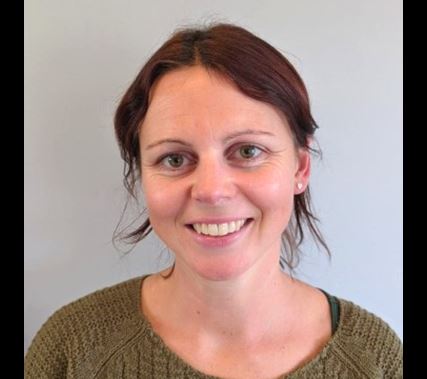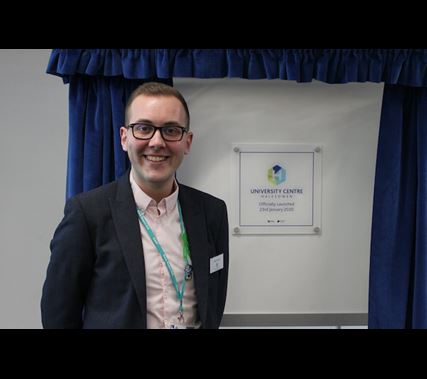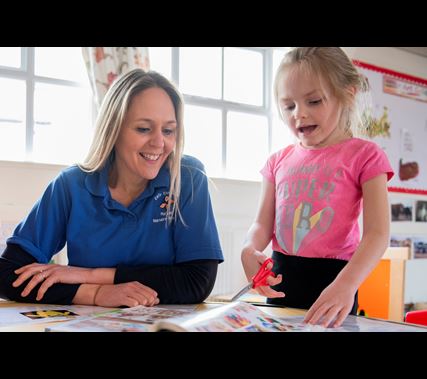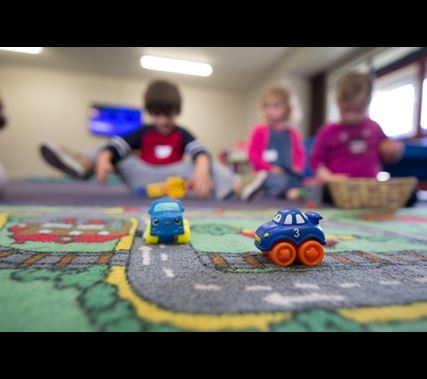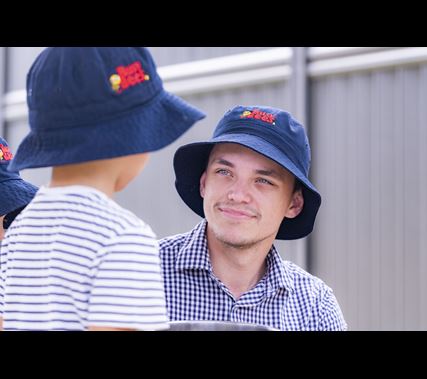Tuning in for inspiration

Insight into the amazing educational journey of Zelpher Ferguson from early years and beyond
In conversation with Dr. Helen Simmons, Senior Lecturer in Education, University of Northampton
NCFE's Janet King chats to Dr. Helen Simmons about her role as course lead for the MA in Infant and Family Mental Health and Wellbeing at the University of Northampton.
Hear from a range of professionals in our podcasts and videos about their incredible career journeys in the sector, to inspire and motivate you.
In conversation with Samantha Dholakia, founder of SPD Training and Consultancy, and creator of The Behaviour Bank
Samantha chats to Janet King about her important work helping nurseries and schools.
Student conference: Child centred practice and the difference we make
Our 11th student conference welcomed 200+ students to hear from fantastic guest speakers considering the difference child centred practice makes to the lives of babies, young children and their families.
Education and childcare Round Table discussion
Sector Manager, Janet King, recently chaired a Round Table event discussing how we are meeting the needs of children and young people with special educational needs and disabilities within the education system.
In conversation with Natalie Cox, Business Support Manager at Active8 Managed Technologies
Natalie Cox talks to Janet King about her role providing technological solutions to the Early years sector.
In conversation with Elizabeth McDonnell, Assessment Solutions Officer, NCFE
Elizabeth McDonnell talks to Janet King about the roles and responsibilities of a SENDCo in a secondary school.
In conversation with Nikki Mears, founder of Naturally Talented Me
Nikki Mears talks to Janet King about her Naturally Talented Me platform, designed to build a personal profile based on an individual's interests.
Sarah Vince-Cain introduces the Growthgraph
Full STEAM ahead with Paula Walshe
Postgraduate Certificate in Advanced Practice in Infant Mental Health and Wellbeing
Endorsed by AIMH, the University of Northampton's Postgraduate Certificate in Advanced Practice in Infant Mental Health and Wellbeing provides aspiring students opportunities to explore, analyse, critique and enhance their understanding of attunement, attachment, bonding and love between infants and their carers.
Careers innovation
Angie Rogers meets Louise Clarke, Careers and Employability Lead at University Centre Truro and Penwith at Truro and Penwith college to discuss her own journey and how that has empowered her to support other in their own career journeys.
Residential Childcare
Laura Thornley, Diploma Assessor at My Choice Children's Homes, discusses the pathway to Residential Childcare.
One of the hardest vocations to choose would be working with vulnerable children. However, it's also one of the most rewarding. Children in the care system have often had very negative experiences and to support positive outcomes for their futures it is crucial that those that care for them have the best possible knowledge and understanding of their needs so they can put interventions and plans into place to help them become the best they can be. One of the biggest problems that residential care faces currently is sustainability in recruitment due to the pressures of the role. Those that have come into the profession to support vulnerable children and protect them from harm are generally caring and compassionate people who want to dedicate their time to providing high levels of care. They often come into the role from other vocational roles and are often then faced with the daunting task of completing their Level 3 diplomas in order to comply with the regulations surrounding the Social Care Common Inspection Framework.
The Level 3 Diploma in Residential Care is one of the largest qualifications I have taught and on top of a demanding and often challenging role, can be a barrier for applicants. Those who are vocational learners or those who have struggled previously with learning in education may be put off by the expectations from this legal requirement. In 2014 Ofsted announced changes which meant that everyone working with vulnerable children must be fully qualified to the level 3 standard and complete the diploma within 2 years, starting from the date of employment. To many this is a terrifying thought or too time consuming against their everyday lives. Employers and colleges were stating that everyone, regardless of prior learning, would need to complete this diploma and it would need to be undertaken in their own time which seems to have been a deterrent for many wanting to apply for the role, meaning that all potential staff would have to complete this regardless if they already had a qualification in 'working with children' or not.
I started with my organisation in 2018 and while I started as an assessor supporting a local authority college, quickly moved on to become a private training centre. I soon understood the challenges of the role and how staff needed to balance their own lives against that of their work. Staff were being employed holding equivalent level 3 qualifications such as CYPW, teaching and learning in schools and EYE and being asked to then complete the full diploma in residential care which equates to 19 units and a lot of hours as well as a duplication of work that had already been completed in their prior learning! After careful examination of the Children Homes Regulations 2015 I reflected upon why this was happening and what could be done to support addressing gaps in knowledge between these qualifications and the residential childcare one. I evaluated the wording in this document around qualification requirements and decided to write our own qualification that 'bridged the gaps in knowledge'.
I recognised that many of our staff were vocational learners and not academic coming into a vocational profession and looked at ways we could address key areas within the role to help learners develop their knowledge in attachment and trauma, keeping safe, positive outcomes and fundamentally the most important, why children are in the care systems and the legalities that surround this. Unfortunately, this is something that colleges did not truly understand as this role is unlike any other, where you are supporting children 24/7 in their homes, a place where they do not have to suppress their feelings or behaviours and a place where they will often express their emotions openly and care is needed consistently, meaning that time for completing diplomas was limited as the needs of the children would always come first.
Based on this, we now provide a non-regulated, NCFE CACHE endorsed qualification called the Bridging programme that offers anyone wanting to come into the industry a way of meeting regulations without having to do the full Level 3 on top of existing qualification. We recognised that staff were often round pegs trying to get into square holes and the pressure that this was placing on them on top of their roles was causing burn out and, in the end, leading to poor staff retention, commitment and dedication and needed to change. Changing this meant that those with existing qualifications in children’s services could be fast tracked to meeting regulations while retaining compliance with Ofsted. Staff were becoming more involved in their roles which is to support children and to put effective planning into place to meet their needs and support their wellbeing and this was being done in a more positive way as there was not the additional pressures of academic learning. They could start to enjoy their time with the children, while having a better understanding of what trauma and attachment was and how best to support this, and focusing on their wellbeing is where the fun of the role really is! Practitioners could focus on the children’s needs and wishes with a therapeutic approach to their care and without the additional pressures of having to complete another full Level 3 qualification.
We have had such positive feedback from Ofsted and from our Reg 44 inspections which are carried out monthly, with one Ofsted inspector challenging me as to why I had put a staff member on the Level 3 instead of the Bridging programme.
Working in residential childcare is very rewarding and you can use a range of skills sets however staff retention is a key element in order to have effective teams and this, from experience, has been managed in a timely and beneficial way by introducing the Bridging programme.
Play therapy is child led and child centred in supporting children’s mental health and wellbeing, providing opportunities for children to work through their feelings emotions and own personal stories.
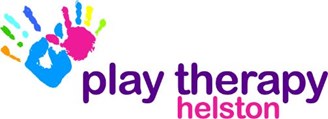
It's vital that children can thrive in provision that has consistently high standards, and that constantly evaluates and reflects on practice to ensure children are positively impacted from the care and education they receive, ultimately making a difference in shaping their future lives.



